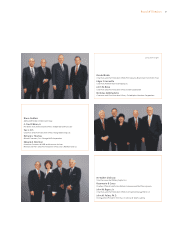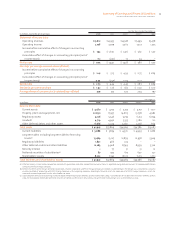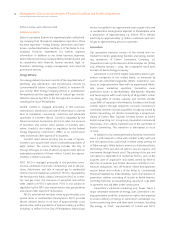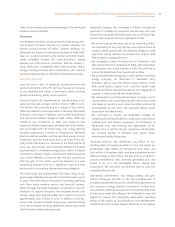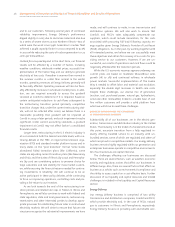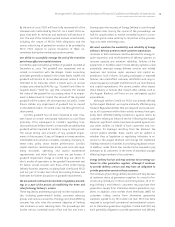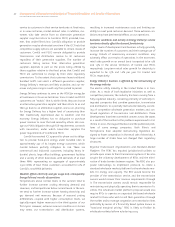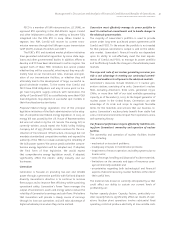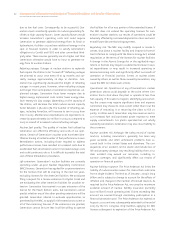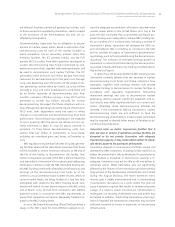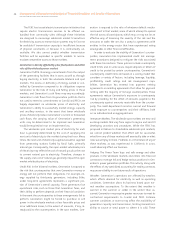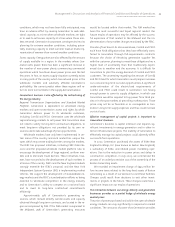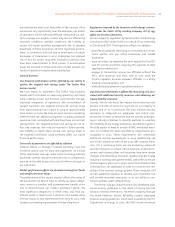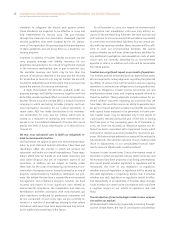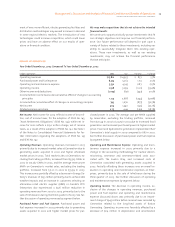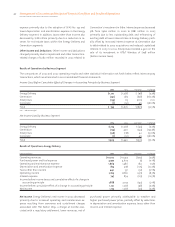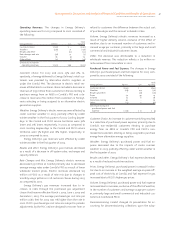ComEd 2003 Annual Report Download - page 33
Download and view the complete annual report
Please find page 33 of the 2003 ComEd annual report below. You can navigate through the pages in the report by either clicking on the pages listed below, or by using the keyword search tool below to find specific information within the annual report.31Management’s Discussion and Analysis of Financial Condition and Results of Operations
EXELON CORPORATION AND SUBSIDIARY COMPANIES
PECO is a member of PJM Interconnection, LLC (PJM), an
approved RTO operating in the Mid-Atlantic region. ComEd
and other Midwestern utilities are seeking to become fully
integrated into the PJM RTO in 2004. When ComEd in-
tegrates into PJM, ComEd will recover its current trans-
mission revenues through the PJM open-access transmission
tariff (OATT), instead of ComEd’s own OATT.
The FERC’s RTO and standard market platform initiatives
have generated substantial opposition by some state regu-
lators and other governmental bodies. In addition, efforts to
develop an RTO have been abandoned in certain regions. We
support both of these FERC initiatives but cannot predict
whether they will be successful, what impact they may ulti-
mately have on our transmission rates, revenues and oper-
ation of our transmission facilities, or whether they will
ultimately lead to the development of large, successful re-
gional wholesale markets. To the extent that ComEd and
PECO have POLR obligations and may at some point no lon-
ger have long-term supply contracts with Generation, the
ability of ComEd and PECO to cost effectively serve their POLR
load obligations may depend on successful spot markets in
their franchised service territories.
Proposed Federal Energy Legislation. One of the principal
legislative initiatives of the Bush administration is the adop-
tion of comprehensive Federal energy legislation. In 2003, an
energy bill was passed by the U.S. House of Representatives
but was not voted on by the U.S. Senate. The energy bill, as
currently written, would repeal the Public Utility Holding
Company Act of 1935 (PUHCA), create incentives for the con-
struction of transmission infrastructure, encourage but not
mandate standardized competitive markets and expand the
authority of the FERC to include overseeing the reliability of
the bulk power system. We cannot predict whether compre-
hensive energy legislation will be adopted and, if adopted,
the final form of that legislation. We would expect
that comprehensive energy legislation would, if adopted,
significantly affect the electric utility industry and our
businesses.
Generation
Generation is focused on providing low-cost and reliable
power through a generation portfolio with fuel and dispatch
diversity. Generation’s direction is to continue to increase
fleet output and to improve fleet efficiency while sustaining
operational safety. Generation’s Power Team manages the
output of Generation’s assets and energy sales to reduce the
volatility of Generation’s earnings and cash flows. We believe
that Generation will provide a steady source of earnings
through its low-cost operations and will take advantage of
higher wholesale prices when they can be realized.
Generation must effectively manage its power portfolio to
meet its contractual commitments and to handle changes in
the wholesale power markets.
The majority of Generation’s portfolio is used to provide
power under long-term purchased power agreements with
ComEd and PECO. To the extent the portfolio is not needed
for that purpose, Generation’s output is sold on the whole-
sale market. Generation’s financial results are dependent
upon its ability to cost-effectively meet the load require-
ments of ComEd and PECO, to manage its power portfolio
and to effectively handle the changes in the wholesale power
markets.
The scope and scale of our nuclear generating resources pro-
vide a cost advantage in meeting our contractual commit-
ments and enable us to sell power in the wholesale markets.
Generation’s resources include interests in 11 nuclear gen-
eration stations, consisting of 19 units. Generation’s nuclear
fleet, excluding AmerGen’s three units, generated 117,502
GWhs, or more than half of our total available generating
capacity, as of December 31, 2003. As the largest generator of
nuclear power in the United States, Generation can take
advantage of its scale and scope to negotiate favorable
terms for the materials and services that our business re-
quires. Generation’s nuclear plants benefit from stable fuel
costs, minimal environmental impact from operations and a
safe operating history.
Our financial performance may be affected by liabilities aris-
ing from Generation’s ownership and operation of nuclear
facilities.
The ownership and operation of nuclear facilities involve
risks, including:
– mechanical or structural problems;
– inadequacy or lapses in maintenance protocols;
– impairment of reactor operation and safety systems due to
human error;
– costs of storage, handling and disposal of nuclear materials;
– limitations on the amounts and types of insurance cover-
age commercially available; and
– uncertainties regarding both technological and financial
aspects of decommissioning nuclear facilities at the end of
their useful lives.
The material risks known or currently anticipated by us that
could affect our ability to sustain our current levels of
profitability are:
Nuclear capacity factors. Capacity factors, particularly nu-
clear capacity factors, significantly affect our results of oper-
ations. Nuclear plant operations involve substantial fixed
operating costs but produce electricity at low variable costs


